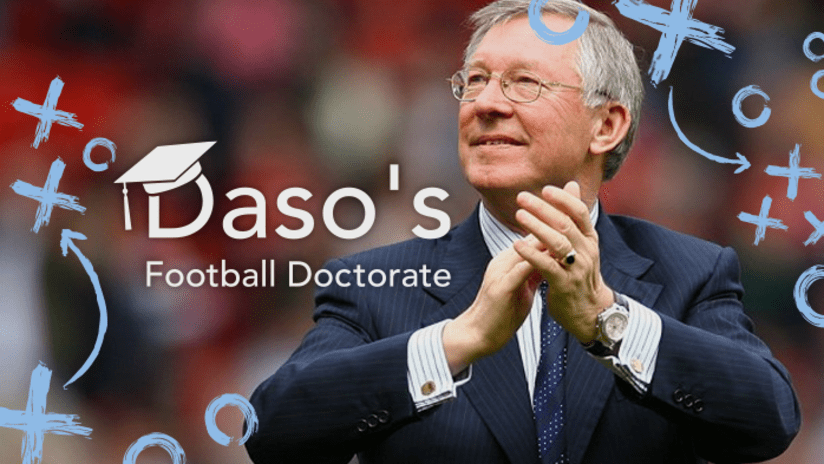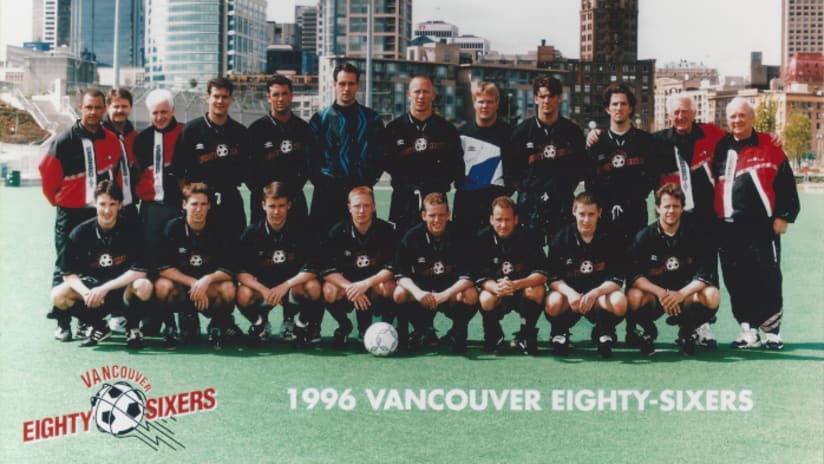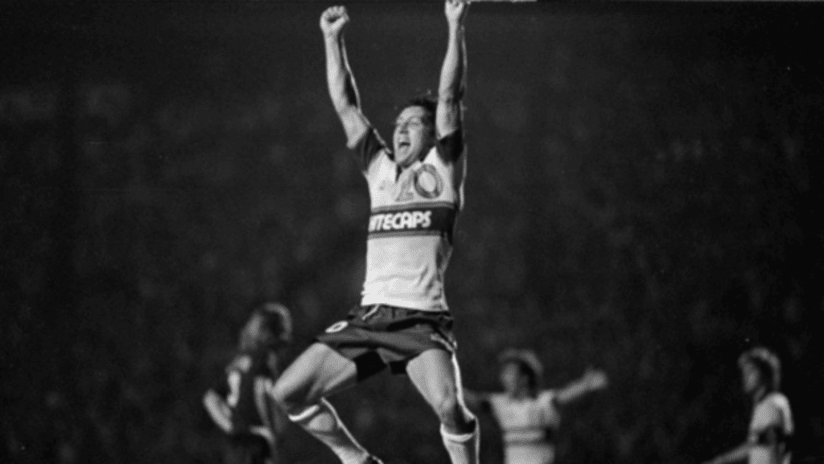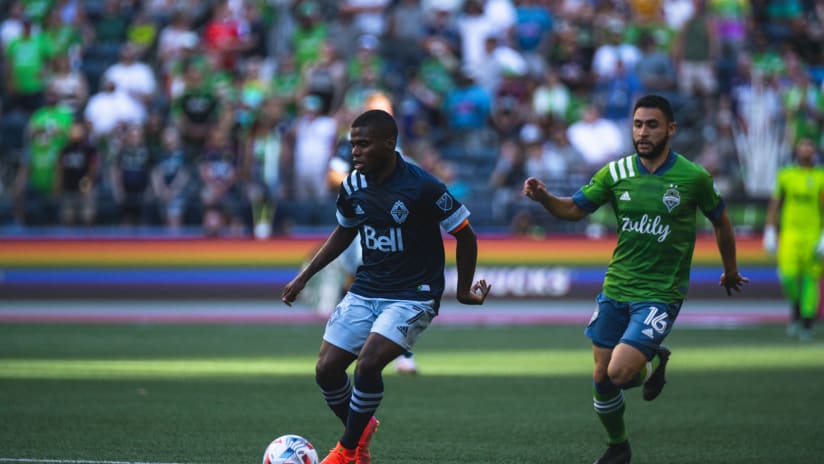Nick Dasovic, head coach of the Whitecaps FC Development Squad, spent nearly two full years earning his UEFA Pro License, the highest coaching license in world football. Many don’t know the work, dedication, and degree of education that goes into this course. In this blog, Daso will tell us about people he met along the way as he went through his program with the Scottish Football Association, and the lessons he learned from each person.
Today, Daso discusses the legendary Sir Alex Ferguson.
The opportunity to meet arguably the best manager in the history of football at one of the largest clubs in the world was exciting and not something that will be forgotten any time soon.
To be given a chance to watch how he goes about his daily business was an honour and a great learning experience. From the onset, the pride of the Scottish coaches was evident as we made our way into the beautiful Manchester United training facility in Carrington.
It was difficult to ignore the feeling of confidence, pride, passion and excellence that filled the facility as we were given an exclusive look into the first team set-up, changing rooms, fields, physiotherapy rooms, pool, gym, and academy training facility. As a manager, Sir Alex Ferguson has won almost every trophy there is in professional football and maybe the only manager in football today that is infallible in the eyes of the football world.
STRUCTURE
Sir Alex began his presentation by highlighting the importance of establishing a proper structure around a football club. He is a strong believer that with a strong structure in place that is surrounded by the right people, that micromanaging is not necessary and gives you the ability to effectively oversee the entire system.
As a manager, it is important that you become one with the entire operation of the club, the academy, reserves, and the first team, so that you can make informed decisions on what is in the best interest for the club.
STANDARDS
Sir Alex held no punches when talking about setting standards and a proper code of conduct regarding behaviour of both staff and players around a club. He used examples to illustrate how challenges to standards by players can affect the entire club if they are not addressed swiftly and decisively.
According to Sir Alex, a good manager never lets the standard drop even on the training ground, because if you do not immediately address them, by for instance stopping training, players will try to take a shortcut again and if they see they can get away with it, then you have lost their respect.
Sir Alex goes on to say that managers should not change their discipline habits and by no circumstances should there be any double standards on a team. All players should be treated equally and fairly and that will avoid any fracturing within the team as a whole.
COACHING STYLE
As a coach, you need to educate players and make them better through different means of coaching - be it practically or visually. According to Sir Alex, it is important to be honest in your assessment of a players’ ability and accept what you cannot change, and do not beat yourself up over situations that are beyond your control.
He prefers to observe players from the sidelines and tries not to get involved in particular drills and sessions. He believes that too many young coaches make the mistake of getting involved and miss seeing what they should be seeing. By standing on the sidelines, a coach can get a good look of the entire game and use what he sees to make informed adjustments.
DECISION MAKING
During Sir Alex’s discussion on decision making, he stressed the importance of being confident and having the courage to make important decisions on your own. He recognizes and accepts that mistakes will happen, which in his eyes is better than being perceived as a weak manager who needs to consult with someone else every time a decision needed to be made. He stresses that you need to be perceived as a strong leader even though, on occasion, you may have some doubts over decisions you have made.
On a couple of occasions, he acknowledged that sometimes you have to be ruthless and trust your eyes and instincts to make the proper decisions for the betterment of the club. This includes avoiding making decisions based on emotion and instead strategically taking into account all the pros and cons a particular decision will have on the club.
POST-MATCH SPEECH
Sir Alex preferred the direct approach when addressing his squad after a game. He would rather address his squad immediately after a game so that it does not simmer over the weekend and he can then start fresh on Monday. He acknowledged that it is important to control your emotions, but emphasized that it is good sometimes for players to see your passion when you address them.
This is a stark contrast to John Hughes’ approach, who preferred to address his teams after the weekend, so that he had some time to process what happened and address the team with a level mindset.
STAFF
Sir Alex recommended that a staff of like-minded individuals is not conducive to creating the necessary dialogue needed to run a consistently winning team. He believes that you will be better served by surrounding yourself with a staff that will challenge you to think on different levels and outside of your comfort zone.
He also stated that your personality needs to come through with your staff and that it is your responsibility to inspire them daily. At the same time, you have to know your staff’s ability and limitations and put them in situations where they will succeed. Along those lines, Sir Alex acknowledged that some people will never be managers and some will never be coaches, so it is important that you identify what works best for you and your staff.
RELATIONSHIP WITH THE MEDIA
Similar to John Hughes, Sir Alex also preferred not to socialize with the media. He preferred to keep the relationship professional, but also acknowledged that it is important to recognize which individuals in the media you can trust.
He recommended that it is in your best interest to learn to only share just enough information to keep them guessing. It is also important to anticipate questions before they are asked which gives you time to think about what you are going to say.
Sir Alex only addresses the media once a week, usually the day before the game. This is a lot different than what I am used to in MLS, where you are expected to address the media up to four to six times a week. As a relatively new league, coaches are expected to do their part in promoting the league.
PHILOSOPHY
Sir Alex also spent some time addressing why he changed the philosophy at the club a number of years ago and the effect the change had after not winning anything for two years immediately afterwards. He felt that the change was necessary to keep Manchester United a consistent championship contender both domestically and in Europe.
During this time, he chose to bring in a number of younger players. He also altered training sessions depending on the competition they were playing in. As a result, they prepared differently for domestic games compared to European games. He identified that the European game is different in its emphasis on possession and the importance of having players that are confident and good with the ball.
Depth becomes a necessity, and with a budget like Manchester United’s, Sir Alex was able to add players that gave him the luxury to change the team quite frequently to keep the team fresh and energized. He often looks three games ahead to properly prepare his team and give them the best chance to win.
Sir Alex’s philosophy of bringing in young players and developing them within the structure of the club is quite different to many of the big spending clubs that mark the landscape of modern football. He is a believer in trusting his scouts to find value in the market and find players that will help keep Manchester United competitive for years to come.
Although winning titles is the primary goal of all managers, it was refreshing to hear that the most satisfaction he had since joining Manchester United was watching many of his young players develop and become world class players.




